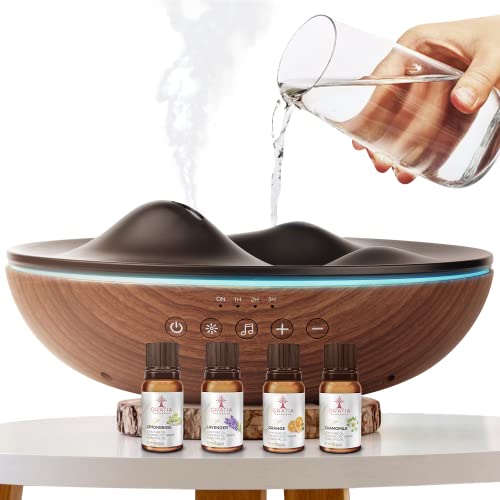Introduction: Essential oil diffusers have gained popularity as a natural and aromatic way to enjoy the therapeutic benefits of essential oils. These devices disperse essential oil particles into the air, creating a fragrant and relaxing atmosphere. In this comprehensive guide, we’ll explore the various types of essential oil diffusers, their unique benefits, and essential maintenance tips to keep them clean and functional.
Types of Essential Oil Diffusers:
- Ultrasonic Diffusers:
- Ultrasonic diffusers use water and ultrasonic vibrations to break down essential oil molecules into a fine mist. They offer humidifying benefits and are known for preserving the integrity of essential oils.
- Nebulizing Diffusers:
- Nebulizing diffusers operate without water and disperse pure essential oil particles into the air. They provide a strong aroma and therapeutic benefits but may consume essential oils more quickly.
- Evaporative Diffusers:
- Evaporative diffusers use a fan or heat source to evaporate essential oils from a pad or surface. They are simple and portable but may not disperse oils as effectively as other types.
- Heat Diffusers:
- Heat diffusers use heat to vaporize essential oils. While they are straightforward to use, they may alter the chemical composition of some oils and reduce their therapeutic benefits.
Benefits of Essential Oil Diffusers:
- Aromatherapy: Diffusers allow you to enjoy the aromatic benefits of essential oils, promoting relaxation, stress reduction, and improved mood.
- Respiratory Health: Essential oil diffusers can help clear the air and provide respiratory relief, especially during cold and flu seasons.
- Improved Sleep: Certain essential oils, like lavender and chamomile, can promote better sleep when diffused in the bedroom.
- Enhanced Focus and Concentration: Diffusing oils like peppermint and rosemary can boost mental clarity and concentration.
Essential Maintenance Tips:
- Regular Cleaning: Clean your diffuser after each use to prevent the buildup of residue and oils. Follow the manufacturer’s instructions for cleaning.
- Use Distilled Water: If your diffuser requires water, use distilled water to prevent mineral buildup in the machine.
- Avoid Citrus Oils: Some essential oils, especially citrus oils, can erode the plastic components of your diffuser. Be cautious when using them.
- Empty Between Uses: If you plan to use a different oil, make sure to empty and clean the water tank to avoid oil residue mixing.
- Check for Warranty: Ensure your diffuser is still under warranty before attempting to repair it yourself. Contact the manufacturer for guidance if it malfunctions.
Conclusion: Essential oil diffusers are versatile and effective tools for enjoying the therapeutic benefits of aromatherapy. By understanding the different types of diffusers, their benefits, and proper maintenance, you can create a fragrant and harmonious environment in your home while ensuring the longevity and functionality of your device. Whether you choose an ultrasonic, nebulizing, evaporative, or heat diffuser, these devices offer a delightful and natural way to enhance your well-being through the power of essential oils.
